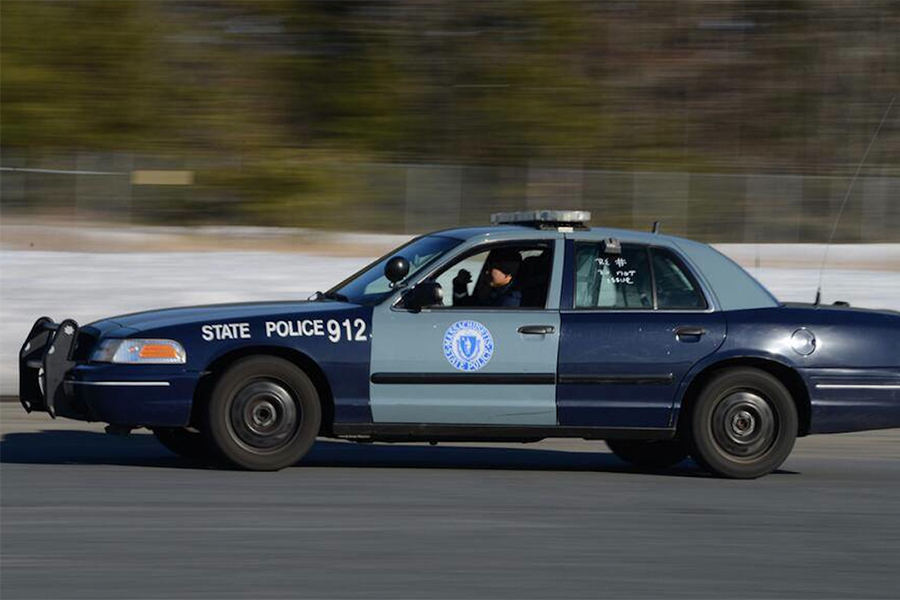How Officials Plan to Overhaul the Scandal-Plagued Massachusetts State Police
One troop will be disbanded, cruisers will be monitored with GPS, and other big changes are coming.

Image via Massachusetts State Police
After weeks of bad headlines for the Massachusetts State Police, officials on Monday announced reforms planned for the scandal-plagued department, including GPS monitoring for troopers, an independent audit of staffing and overtime, and a new body camera program.
The sweeping changes followed revelations that troopers were taking home gargantuan paychecks and were in some cases paid for scores of shifts they didn’t actually work.
At a Monday press conference to announce the overhaul, Gov. Charlie Baker Baker seemed genuinely angered by the reported bad behavior and lack of oversight among some in the force. Joined by State Police Col. Kerry Gilpin, he suggested those who abused their positions might face criminal charges (if deemed appropriate after an investigation led by the Attorney General’s office), and possibly lose their pensions.
“The Massachusetts State Police swore an oath to the citizens of the Commonwealth to fulfill their duties with dignity and integrity, and a series of recent incidents has sadly tarnished the department’s trust with the public,” Baker said in a statement on Monday. “To restore transparency and accountability, our administration has collaborated with the Colonel on these reforms and I look forward to their swift implementation.”
Officials said GPS-enabled Automated Vehicle Location devices will be used to monitor the location of state police cruisers—in other words, to make sure troopers are where they’re supposed to be. The devices are already installed in state police vehicles, and just need to be turned on.
Troop E, which is charged with monitoring the Mass Pike, will be disbanded, and patrolling the highway will become a responsibility shared by existing troops along its route. This comes after at least 30 of the troopers from Troop E were allegedly paid in 2016 for shifts they did not actually work.
Troop F, which patrols Logan Airport and other MassPort properties, will now be paid directly by the state police, and then reimbursed by MassPort. Payroll data for the troop had reportedly not been disclosed to the state since 2010. Many troopers logged overtime hours worth more than $100,000, and were being paid as much as $350,000 a year.
The department will also hire a firm to conduct an independent audit of staffing levels to determine whether the department is relying too much on overtime shifts to meet its needs. Going forward, the department’s top 50 earners will also be subject to an automatic audit. And ten additional personnel will be hired in oversight and accountability roles, officials said.
State Police will also follow Boston’s lead and launch a plan to equip troopers with body-worn cameras, which Baker said he hoped would begin by the end of this year.
Baker has also asked state and city police to look into shared oversight of the Seaport—much of which is controlled by MassPort, and thus falls under state police jurisdiction, despite being a thriving Boston neighborhood. The unusual arrangement has sparked what’s been described as a “turf war” among state and local law enforcement.
In addition, officials said they would explore strengthened background checks for new state police hires, and said a revised questionnaire will ask whether a candidate was involved in a criminal investigation, regardless of whether they were charged with a crime. This come after the revelation that a state police trooper had previously testified in court that she helped an ex-boyfriend deal drugs.
“These reforms are a product of collaboration between my command staff, the administration, and me, with the shared goal of increasing the efficiency, transparency and accountability of the State Police while further enhancing our capabilities to protect everyone who lives in, works, and travels through our state,” Col. Gilpin, who Baker appointed to the position after Col. Richard McKeon retired in November amid a scandal involving altered arrest reports. “I believe these reforms will improve the entire department from top to bottom, and better serve our dedicated troopers and the public. Their implementation will require much planning and hard work. We are committed to that effort.”


